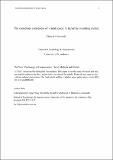The conscious awareness of visual space : a tripartite encoding model
Abstract
The prevailing model of 3D vision proposes that the visual system recovers a single internally consistent representation of physical 3D space based on a process of ideal-observer probabilistic inference. A significant challenge for this model has been in explaining our subjective awareness of visual space. Here it is argued that integrating phenomenological observations, empirical data, evolutionary logic, and neurophysiological evidence leads to the conjecture that the human conscious awareness of visual space is underwritten by multiple, sometimes mutually inconsistent, spatial encodings. By assessing four primary competencies in the conscious awareness of space, three major types of spatial encodings are conjectured. Among the most primitive of these is proposed to support the competency of the conscious awareness of distance at an ambulatory scale and is hypothesized to originate in medial temporal areas in allocortex. The second is proposed to support the competency of awareness of object layout and 3D shape without scale (operationally defined as relative depth) hypothesized to have evolved from primitive encodings that provide a depth-ordered segmentation of the visual field. The third encoding is proposed to support the competency of fine-grained awareness of intra- and inter-object distances and object scale in near space (operationally defined as scaled depth), likely involving the posterior parietal cortex and is conjectured to underlie the phenomenology of tangibility, spatial separation (negative space) and object realness that is often referred to as stereopsis. The first and third encoding are conjectured to contribute to the feeling of spatial immersion and presence.
Citation
Vishwanath , D 2021 , ' The conscious awareness of visual space : a tripartite encoding model ' , Psychology of Consciousness: Theory, Research, and Practice , vol. First Online . https://doi.org/10.1037/cns0000280
Publication
Psychology of Consciousness: Theory, Research, and Practice
Status
Peer reviewed
ISSN
2326-5523Type
Journal article
Description
Dhanraj Vishwanath was supported by a Leverhulme Foundation Grant RPG-2016-269.Collections
Items in the St Andrews Research Repository are protected by copyright, with all rights reserved, unless otherwise indicated.

